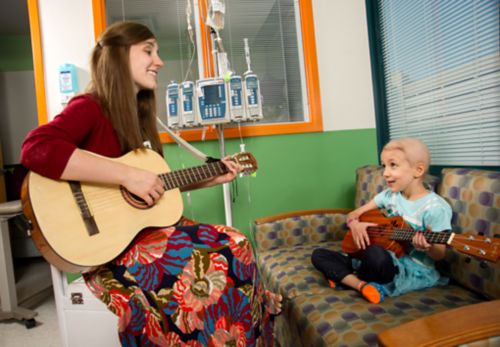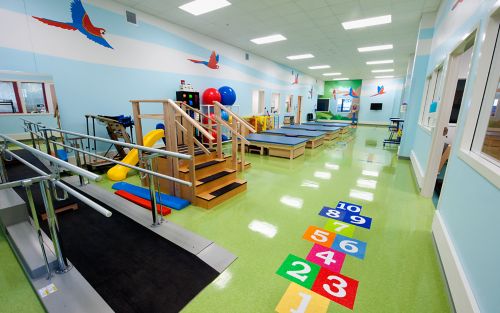Music therapy uses music to promote healthy coping during medical treatments. It helps children express themselves and connect with others.
All patients can benefit from music therapy. A musical background or music skills are not needed.
Music therapists are part of the care team. They work with psychologists, social workers, and other experts to develop the best therapy for each child.
Benefits of music therapy
The brain processes information such as sights and sounds. These things help us make sense of the world around us. Music allows us to understand complex ideas.
Music therapy activates areas of the brain that control our emotions, memory, and physical movement.
Music therapy offers many benefits. It may help to:
- Improve gross motor skills, which involve large muscle groups
- Improve fine motor skills, which use the small muscles of the hands
- Encourage movement during physical therapy or occupational therapy
- Make patients more involved in treatment
- Provide emotional support
- Offer positive connections with the care team
- Decrease feelings of pain and anxiety
- Provide a way to express feelings
- Create special memories
- Decrease fear during medical care
Music can bring about powerful images, feelings, or thoughts. Talk with your child’s care team about how music therapy can be part of their care plan.
Music therapists use different activities as they work with patients. A patient in music therapy may:
- Listen to music
- Play instruments with or without help
- Write and/or record songs
- Sing
- Move to music
- Think about the meaning of song lyrics
Music therapy for young children
The type of music therapy may vary by age and level of development. Infants in music therapy may:
- Listen to music
- Explore small instruments
- Learn to self-regulate
- Bond with caregivers
A music therapist may also ask the caregiver to sing to the infant. This activity has many benefits and may promote bonding of the child and the caregiver.
Music therapy can help toddlers:
- Adjust to the hospital
- Become more comfortable with medical staff
- Know what to expect during transitions or medical appointments
- Grow and develop in positive ways
Music therapy for school-aged children
For school-aged children, music therapy can help with physical, emotional, social, and academic needs. It offers the chance to express thoughts and feelings that may be difficult to express. It can help them:
- Manage anxiety
- Manage pain
- Engage with other patients their own age
- Learn positive coping skills
- Be creative
- Maintain or regain movement skills
Older children and teens in music therapy may listen to, create, or study music and lyrics. Music therapy can help teens:
- Relax and improve sleep
- Understand and better express emotions
- Be more motivated
- Maintain social connections
- Improve self-esteem
- Be more independent
- Remain active and involved in their treatment
Questions to ask your care team about music therapy






